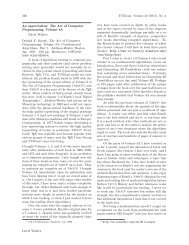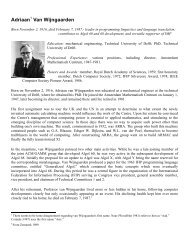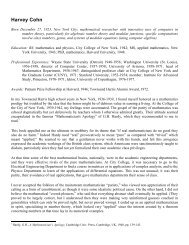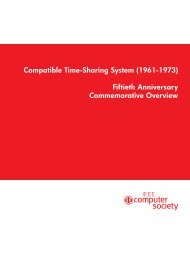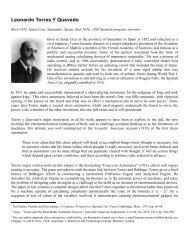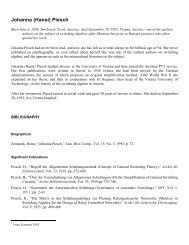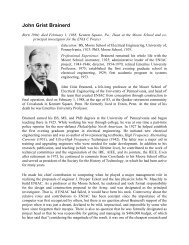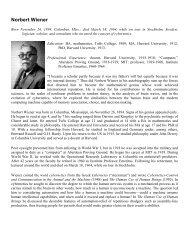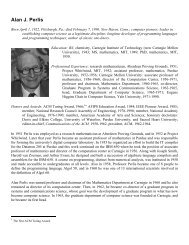L - Walden-family.com
L - Walden-family.com
L - Walden-family.com
Create successful ePaper yourself
Turn your PDF publications into a flip-book with our unique Google optimized e-Paper software.
]<br />
Bolt Beranek and Newman Inc.<br />
(store and forward traffic, Host traffic, etc.) is always guaranteed<br />
some buffers. For the sake of program speed and simplicity, no<br />
attempt is made to retrieve the space wasted by partially filled<br />
buffers.<br />
In handling store and forward traffic, all processing is on<br />
a per-packet basis. Further, although traffic to and from Hosts<br />
is <strong>com</strong>posed of messages, the IMP converts to dealing with packets;<br />
the Host transmits a message as a single unit but the IMP takes<br />
it one buffer at a time. As each buffer is filled, the program<br />
selects another buffer for input until the entire message has<br />
been provided for. These successive buffers will, in general,<br />
be scattered throughout the IMP's memory. An equivalent inverse<br />
process occurs on output to the Host after all packets of the<br />
message have arrived at the destination IMP. No attempt is made<br />
to collect the packets of a message into a contiguous portion<br />
of IMP memory. The allocation of buffer space in core storage<br />
is shown in Figure 4, as mentioned previously. Notice that<br />
code is generally centered within a page, and there is code<br />
on every page of core.<br />
The IMP program uses the following set of rules to allocate<br />
the approximately 80 available buffers to the various tasks<br />
requiring them:<br />
· Each line must be able to get its share of buffers<br />
for input and output. In particular, one buffer is<br />
always allocated for output on each line, guaranteeing<br />
that output is always possible for each line. Double<br />
buffering is provided for input on each line, which<br />
permits all input traffic to be examined by the program.<br />
Thus, acknowledgments can always be processed, which<br />
frees buffers.<br />
l<br />
]<br />
:J<br />
:]<br />
:]<br />
1<br />
]<br />
t]<br />
J<br />
•],<br />
' '<br />
]<br />
]<br />
J<br />
J<br />
J<br />
3-4 8/73



